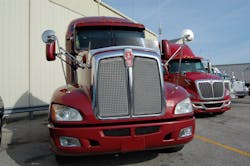The real struggle: Convincing shippers that trucking has value
John Larkin, managing director and head of transportation capital markets research for Stifel Capital Markets, recently made what I think is a very important point for trucking companies: most shippers seem poised to continue hammering the industry with the cudgel of low freight rates, despite the myriad of challenges faced by motor carriers.
“With all the respect in the world for shippers that appear at industry events, we must understand that these are the enlightened shippers,” Larkin explained during the year executive capstone seminar held by the University of Denver’s Transportation Institute.
“Talk of collaboration, gain sharing, compensatory rates, real-time data exchange, and asset utilization enhancement is still the conversation of the enlightened shippers. Our fear is that still a good 75% of shippers have yet to be enlightened,” he stressed. “Instead these less desirable, almost detestable shippers focus on low price – not service or mutual value creation. They don’t care about driver turnover, hours of service, levels of insurance coverage, [or] ELD [electronic logging device] installation.”
Larkin warned, though, that a “cold hard truth” in on the way, in the form of what he has long dubbed “the mother of all capacity shortages” due to the implementation of ELDs this year; a capacity shortage he expects will finally materialize late in 2017 or in early 2018.
“We expect the percentage of enlightened shippers to skyrocket at that time as ELDs, speed limiters, and the retirement of veteran drivers accelerates the effective reduction of capacity across the industry,” he said.
Yet there is another trend at work alongside this growing concern regarding trucking capacity and that’s truck “optimization.” Sandeep Kar, global vice president for research and mobility at Frost & Sullivan, for one, contends that technology is positioned to help trucking “optimize” to much more highly-efficient degree.
“We now have technologies available for logistics, social media integration, traffic predicting software, intelligent transport systems, third party technology providers, etc.,” he explained in a conference call late last year.
“And, in the vehicle, there are location bay sensors and technology that can be used and then analyzed using data analytics, systems, warehouse management systems, and fleet management systems to deliver mission-and time-critical solutions, such as individually-optimized transportation solutions, quality control on the move, on-the-fly deliveries, self-pickups, etc.,” Kar added.
“What we’re talking about is a future where technology will conspire with operations to ensure that truck and that box reach its destination on time using the shortest route possible and lowest fuel consumption profile possible,” he emphasized.
But if shippers won’t pay a decent freight rate to gain such capabilities, what is the point of all of it? Yes, making trucking operations more efficient and less costly helps the motor carrier’s bottom line, certainly, but if they can’t convince shippers that such improvements are worth a higher rate – that they add value for the shipper’s operations, too – we’ll stay stuck in the “trucking is a commodity” mindset.
[As an aside, Navistar’s push to create what it calls an “open telematics ecosystem” for its vehicles is being done in part to help its trucks avoid becoming “commoditized” as well.]
Kar also mentioned telematics firms are trying out a similar “value proposition” with their trucking customers and maybe it’s something truckers themselves could deploy with shippers.
“If I’m a fleet manager and a telematics vendor comes to me and says, ‘I can save you $8,000 per truck per year, and if I can demonstrate that savings to you, will you pay me $2,000?’ I will be happy to do that because that makes more sense to me than paying a telematics services fee without realizing the benefits because there’s nobody out there to guide me,” he explained. “What I’m suggesting is that maybe in the future we’ll see telematics service providers taking a more consultative role. That is a real possibility that we are forecasting.”
It very well might work with recalcitrant shippers suddenly faced with a steep reduction in available trucking capacity. But we’ll see.

